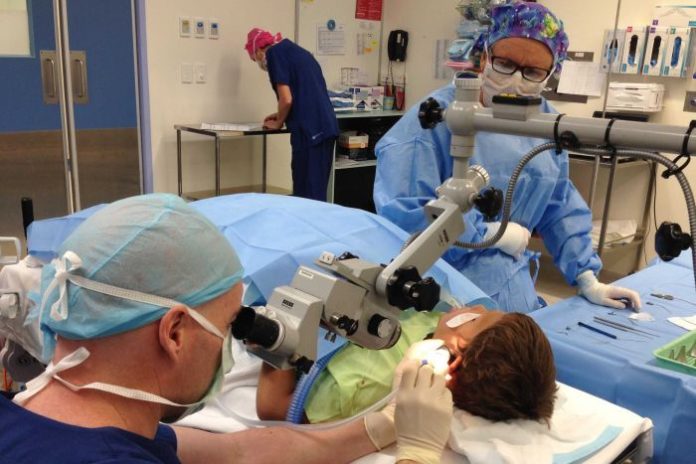
Slashing the disadvantage gap between Indigenous and non-Indigenous Australians may be as simple as a three-minute ear operation, a Queensland surgeon has said.
It’s the essential equivalent of having their heads under water, trying to conduct themselves during the day.
Dr David McIntosh
The rate of chronic middle ear infection among Aboriginal and Torres Strait Islander children is among the highest in the world.
If untreated, the condition, known as otitis media, can create life-long problems for learning, getting work and staying out of jail.
Ear, nose and throat specialist David McIntosh said children with “glue ear” have thick, sticky fluid stuck behind their eardrum.
“It’s the essential equivalent of having their heads under water, trying to conduct themselves during the day,” Dr McIntosh said.
Six-year-old Bubejah Bell knows exactly what that is like.
‘They are not being ignorant, they are deaf’

Before he was diagnosed with otitis media, the Gympie South schoolboy was so distracted and disruptive at school he attended for only two-and-a-half hours a day.
“He couldn’t hear the teachers properly,” his mother, Dora Maloney, said.
“They thought he was being naughty towards them, so it frustrated him.”
We took them to the doctor, who said “they are not being ignorant towards you, they are deaf”.
Dora Maloney
Bubejah’s hearing problems were picked up through a school screening program run by the North Coast Aboriginal Corporation for Community Health (NCACCH).
Three of his four brothers were also found to have hearing problems requiring surgery.
“We were singing out to them constantly, but ‘boys will be boys’, we thought,” Ms Maloney said of herself and partner Renzi Bell when their sons routinely ignored them.
“So we took them to the doctor, who said ‘they are not being ignorant towards you, they are deaf’.”
But not anymore — at least for Bubejah and one of his brothers, 10-year-old Peter Maloney.
While many children who need ear surgery must wait for months, if not years, on public hospital waiting lists, the two boys were among 15 Indigenous children who recently underwent day surgery at Noosa Private Hospital.
That was thanks to an initiative spearheaded by NCACCH and Dr McIntosh, who together secured $50,000-$70,000 in federal funds to pay for the surgical blitz.
Minutes-long procedure creates lifetime of difference
Dr McIntosh and others also donated their time and skills along the way.
“That’s what these kids are trying to listen through,” Dr McIntosh said in the operating theatre as he pulled a thick, ropey strand of “glue” out of Bubejah’s ear.
“We’re just vacuum cleaning it out as best we can,” he said, before inserting a grommet, a tiny tube implanted in the eardrum to prevent fluid building up in the middle ear.
The procedure takes only minutes, but can create a lifetime of difference.
Good hearing opens doors to education, employment and social inclusiveness.
Dr McIntosh said it is not just good for the individual but good for the nation and the economy.
Only an hour after the operation, Peter was in a recovery ward listening to the television with a handheld audio unit to his ear.
“What volume have you got it on?” I asked him.
“One,” he replied.
“And before?” I questioned.
“I couldn’t hear it on 10,” he said with a smile.
His mother is delighted.
“I was speaking with Peter over the phone this week and he said ‘you don’t need to yell’,” she said with a laugh.
Indigenous ear health should be national priority: expert
Dr McIntosh said he believed such easy but crucial treatment should not be dispensed as a special one-off opportunity.
He wants Indigenous ear health made a national priority, and a streamlined national approach taken to treatment.
“We have the merry-go-round of the state versus federal discussions on delivering health care. And that hasn’t been a productive discussion,” he said.
“At the moment we have a whole lot of programs coming in left, right and centre trying to fill up these gaps in the system.
“Instead of having multiple programs and so forth, we could have what we already have in Australia with the war veterans.
You need to prioritise people who are deaf and fix it up so it all comes together, and maybe we can all get a job, eh?
Dora Maloney
“The war veterans have access to specialist care and can access it through public and private means at no cost to them, and their health care is advantageous. If something is made accessible it’s more easily used.”
While otitis media is common across Australia’s population, it is more often a chronic problem for Indigenous families in both rural and urban households.
Extended family living can lead to over-crowded homes and a continual merry-go-round of colds and infections.
Not being able to access health services because of distance or finances is another factor, according to Dr McIntosh and other health workers.
The World Health Organisation has said if 4 per cent of children have chronic otitis media it is a massive health issue requiring urgent attention.
Amongst Indigenous Australian children, the rate is at least four or five times that.
Dr McIntosh acknowledged the importance of current programs tackling education, prevention and diagnosis, but said there also needed to be easy access to surgery if needed.
“We know this works. The problem is being able to do it under … the health structure as it is,” he said.
Ms Maloney said: “You need to prioritise people who are deaf and fix it up so it all comes together, and maybe we can all get a job, eh?”


